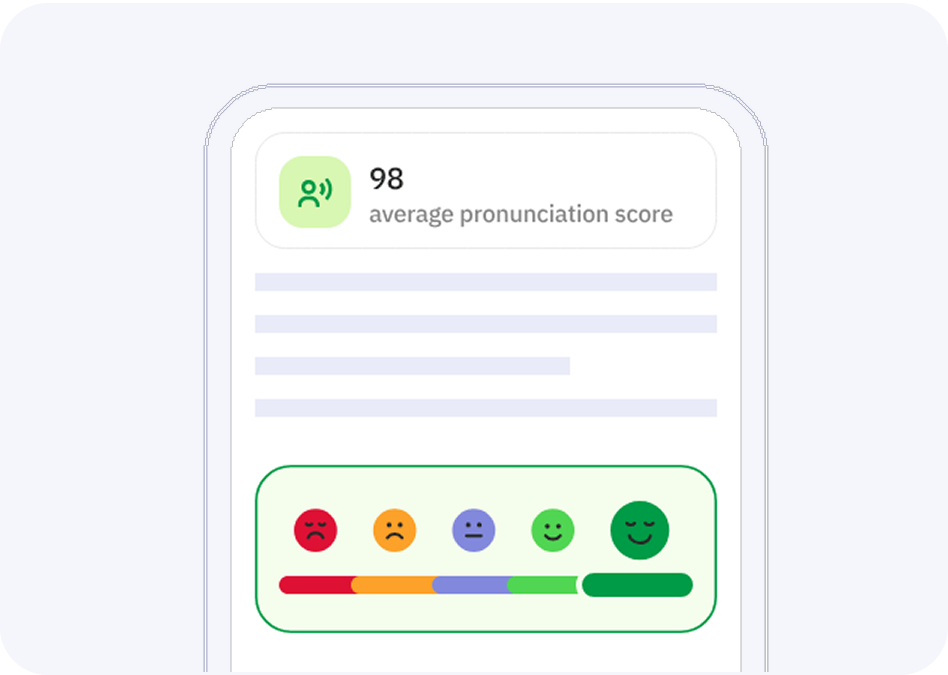Spoken English Practice With AI
Mastering spoken English is essential for anyone looking to enhance their communication skills in a global context. Whether for professional growth, academic success, or personal improvement, practicing spoken English can open doors to numerous opportunities. Here, we explore various aspects and tools, such as Talkpal AI, which can significantly augment your learning journey.

The talkpal difference

Personalized Education
Everyone absorbs information differently. By utilizing Talkpal's advanced capabilities, we analyze the study habits of millions of users at once to build highly effective educational environments that adapt to the specific needs of every student.

Cutting-Edge Technology
Our main mission is to lead the way in providing accessible and tailored educational journeys for everyone by leveraging the most recent breakthroughs in modern innovation.

Making Learning Fun
We have transformed education into an entertaining activity. Since staying motivated can be difficult in a digital setting, we designed Talkpal to be incredibly captivating so that users actually prefer building new communication skills over playing video games.
LANGUAGE LEARNING EXCELLENCE
The most efficient way to learn a language
Try Talkpal for freeIntroduction to Spoken English Practice
1. Importance of Regular Practice
Practicing spoken English regularly is crucial for linguistic fluency and confidence. Just like in sports or music, consistent practice helps in solidifying the grasp on different phonetic sounds and vocabulary. It decreases the hesitation in real conversations and builds a natural flow in speaking. Engaging daily in spoken English exercises can transform theoretical knowledge into practical prowess, preparing a learner for real-world interactions.
2. Role of Interactive Tools in Learning
In the digital age, innovative tools such as Talkpal AI play a pivotal role in enhancing the learning of spoken English. These tools often simulate real-life interactions, allowing learners to practice speaking in diverse scenarios without the pressure of real human judgement. This can significantly lower the barrier for beginners and help intermediate learners refine their accent and vocabulary.
3. Practical Tips for Effective Practice
Effective spoken English practice involves more than just speaking; it requires active listening and feedback incorporation. One can start with basic phrases and gradually move to complex sentences. Recording one’s voice and comparing it with native speakers can provide valuable insights into areas of improvement. Additionally, repeating challenging phrases and focusing on difficult sounds can improve one’s pronunciation over time.
4. Benefits of Group Practice
Engaging in group practice sessions can be particularly beneficial. By interacting with fellow learners, one can expose themselves to various accents and speaking styles. This not only aids in understanding diverse linguistic nuances but also helps in overcoming the fear of making mistakes in public. Group settings mimic real-life social interactions, making them invaluable for spoken English practice.
5. Using Technology to Simulate Conversations
With advancements in technology, tools like Talkpal AI allow learners to engage in simulated conversations. This AI-driven approach tailors dialogues based on the learner’s proficiency level and personal learning pace, providing a customized learning experience. Such simulations can cover a range of topics, from casual day-to-day interactions to business communication scenarios, offering practical speaking practice.
6. The Importance of Feedback in Learning
Feedback is a critical component of learning to speak English effectively. Whether from a software tool, instructor, or peer, constructive criticism helps identify mistakes and areas for improvement. Regular feedback can guide learners in making focused and strategic improvements, thereby accelerating the learning process.
7. Overcoming the Fear of Speaking
One of the biggest challenges learners face is the fear of speaking English fluently. This psychological barrier can be mitigated through continuous practice and positive reinforcement. Tools that provide a non-judgmental platform for speaking, like Talkpal AI, can be particularly effective in helping individuals overcome this fear.
8. Incorporating Native Idioms and Phrases
To sound more like a native speaker, one must understand and incorporate idioms and culturally specific phrases into their vocabulary. This requires not only memorizing these phrases but also understanding the context in which they are used. Practice using these in simulated conversations or with native speakers can enhance authenticity in one’s spoken English.
9. Tracking Progress
Maintaining a log of one’s progress in spoken English can be highly motivating. Tools like Talkpal AI often provide statistical insights into the learner’s progress, highlighting areas of strengths and those needing improvement. Watching oneself improve over time can boost confidence and motivation, key drivers for continued learning and practice.
10. The Role of Immersion in Learning
Full immersion is often touted as one of the most effective ways to learn a language. This involves surrounding oneself with the language through media such as movies, podcasts, and books, in addition to practicing speaking. This continual exposure complements formal practice and deepens understanding and fluency in English.
Each of these strategies plays a vital role in mastering spoken English, offering learners various tools and techniques to enhance their language skills effectively and enjoyably.
The most efficient way to learn a language
Try Talkpal for freeFrequently Asked Questions
What is the best way to practice spoken English?
How often should I practice speaking English to see improvement?
Are there specific tools or apps recommended for spoken English practice?
Can group classes or online meet-ups help with spoken English?
What are the common challenges in spoken English practice and how can I overcome them?







